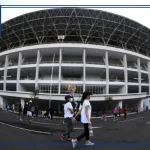In a country where football holds a unique place in the hearts of millions, the intersection of sports and public welfare initiatives can have a transformative impact. Recently, the Indonesian Football Association (PSSI) Chairman expressed enthusiastic support for the free nutritious meal Blog SBOTOP program spearheaded by Prabowo Subianto and Gibran Rakabuming Raka. This program aims to address malnutrition and improve the health of young athletes, thereby fostering a healthier, more vibrant future generation. This article delves into the details of the program, its expected benefits, and the implications for Indonesian football and broader societal health.
The Free Nutritious Meal Program: An Overview
Origins and Objectives
The free nutritious meal program was initiated by Prabowo Subianto, the Defense Minister of Indonesia, and Gibran Rakabuming Raka, the Mayor of Surakarta. Recognizing the critical Trik taruhan bola 2024 link between nutrition and overall well-being, the program aims to provide balanced, nutritious meals to children and adolescents, particularly those in underserved communities. The primary objective is to combat malnutrition and ensure that young individuals receive the essential nutrients needed for their growth and development.
Target Demographics
The program focuses on school-aged children and young athletes, with a special emphasis on those participating in sports programs. By targeting this demographic, the initiative seeks to improve Judi bola EURO 2024 the physical and cognitive development of children who may not have consistent access to nutritious meals. Ensuring that young athletes receive proper nutrition is particularly crucial, as their bodies require additional energy and nutrients to support their active lifestyles.
Implementation and Reach
The implementation of the program involves collaboration with local schools, sports clubs, and community organizations. Meals are provided daily, consisting of balanced portions of protein, carbohydrates, vegetables, and fruits. The program also includes educational components, teaching children and their families about the importance of healthy eating habits. Initially launched in Surakarta, the program aims to expand to other regions across Indonesia, leveraging local partnerships to maximize its reach and impact.
PSSI’s Involvement and Support
Alignment with PSSI’s Vision
The PSSI Chairman’s enthusiastic support for the program is rooted in the alignment of its goals with PSSI’s broader vision for Indonesian football. The association has long recognized the importance of player health and well-being as foundational to the success of football in the country. By endorsing the nutritious meal program, PSSI underscores its commitment to nurturing young talent and ensuring that aspiring footballers have the physical foundations necessary to excel.
Enhancing Youth Development Programs
PSSI’s youth development programs are integral to the future of Indonesian football. These programs focus on identifying and nurturing young talent from an early age, providing them with the skills and training needed to succeed at higher levels of competition. Integrating the nutritious meal program into these youth development initiatives enhances their effectiveness, as proper nutrition is essential for optimal physical and mental performance. Well-nourished players are more likely to exhibit better stamina, agility, and concentration, which are crucial attributes on the football field.
Collaborations and Partnerships
The collaboration between PSSI and the Prabowo-Gibran initiative exemplifies the power of partnerships in achieving common goals. By working together, the organizations can pool resources, share expertise, and create a more comprehensive support system for young athletes. PSSI can leverage its extensive network of football clubs and academies to facilitate the distribution of nutritious meals and ensure that the program reaches those who need it most.
Benefits of the Nutritious Meal Program
Improved Physical Health
The most immediate benefit of the nutritious meal program is the improvement in physical health among participants. Adequate nutrition is vital for the growth and development of children, and it has a direct impact on their physical capabilities. By providing balanced meals, the program helps to address nutrient deficiencies, reduce the prevalence of malnutrition, and promote overall health. For young athletes, proper nutrition translates to enhanced physical performance, quicker recovery times, and a lower risk of injuries.
Cognitive Development
Nutrition also plays a critical role in cognitive development. Studies have shown that well-nourished children perform better academically and exhibit improved concentration and memory. The educational component of the program, which emphasizes healthy eating habits, empowers children and their families to make informed dietary choices. This holistic approach supports not only the physical but also the intellectual growth of young individuals, contributing to their success both on and off the field.
Long-Term Societal Impact
The long-term impact of the nutritious meal program extends beyond individual health benefits. By addressing malnutrition and promoting healthy eating habits, the program contributes to the creation of a healthier, more productive society. Improved health outcomes can lead to better educational achievements and increased economic opportunities, breaking the cycle of poverty and contributing to overall societal well-being. Furthermore, by nurturing young athletes, the program supports the development of future sports stars who can inspire and unite the nation.
Challenges and Considerations
Logistical Challenges
Implementing a program of this scale presents several logistical challenges. Ensuring the consistent delivery of fresh, nutritious meals requires efficient supply chain management and coordination with local suppliers. Additionally, maintaining food safety and quality standards is crucial to prevent any adverse health effects. Addressing these logistical challenges requires careful planning, robust infrastructure, and ongoing monitoring.
Ensuring Sustainability
Sustainability is a key consideration for the success of the nutritious meal program. Securing long-term funding and resources is essential to maintain the program’s operations and expand its reach. Engaging stakeholders, including government agencies, private sector partners, and community organizations, can help to build a sustainable support system. Additionally, incorporating feedback mechanisms and continuously evaluating the program’s impact can ensure that it remains responsive to the needs of the communities it serves.
Cultural Sensitivity
Cultural sensitivity is another important factor in the program’s implementation. Indonesia is a diverse country with varied dietary preferences and traditions. Ensuring that the meals provided align with local tastes and cultural practices is crucial for the program’s acceptance and success. Engaging with local communities and involving them in the planning and execution process can help to address this challenge and promote a sense of ownership and participation.
Case Studies: Success Stories from the Program
A Young Athlete’s Journey
One of the most compelling success stories from the nutritious meal program is that of a young athlete from Surakarta. Prior to joining the program, he struggled with undernourishment, which affected his performance on the football field. After consistently receiving balanced, nutritious meals through the program, his physical health improved significantly. He reported increased energy levels, better stamina, and quicker recovery times. These improvements translated into enhanced performance during training and matches, earning him recognition and opportunities to compete at higher levels.
Community Impact
In another instance, a local school in Surakarta experienced a noticeable improvement in student health and academic performance after the introduction of the nutritious meal program. Teachers observed that students were more attentive in class, exhibited better concentration, and participated more actively in physical activities. The program also fostered a sense of community, as parents and teachers collaborated to support the initiative. This collective effort strengthened community bonds and underscored the importance of nutrition for overall well-being.
Future Prospects and Expansion
National Expansion
The success of the nutritious meal program in Surakarta has set the stage for its expansion to other regions across Indonesia. By leveraging lessons learned and best practices from the initial implementation, the program aims to scale its operations and reach more children and young athletes. National expansion requires strategic planning, resource allocation, and the establishment of local partnerships to ensure effective delivery and impact.
Integration with National Policies
Integrating the nutritious meal program with national health and education policies can enhance its sustainability and reach. By aligning the program with government initiatives aimed at improving child health and nutrition, it can gain broader support and funding. Collaboration with relevant ministries and agencies can facilitate policy integration and create a cohesive framework for addressing malnutrition on a larger scale.
Technological Innovations
Incorporating technological innovations can further enhance the program’s effectiveness. For instance, using mobile apps to track meal delivery and monitor nutritional intake can provide valuable data for program evaluation. Technology can also facilitate communication and engagement with participants and their families, promoting awareness and education about healthy eating habits. Embracing digital tools can streamline operations and improve the overall efficiency of the program.
Baca Juga :






















